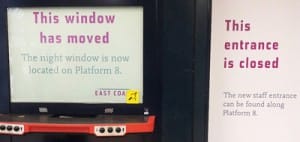
I see, via the excellent Robert Brook mail-out (do please subscribe), that there’s another site out there trying to cut the biggest Gordian knot of all in the field of customer services. Of course customers want cheapness. Of course customers want quality. But the two are in tension against each other.
Unlike the cruder saynoto0870 about which I’ve written before, Get Human attempts a subtler combination of crowd-sourced wisdom not only on what channels prove to be the best for getting through to Customer Services, but also offering handy hints on how to navigate them more easily once you’re connected.
Sample: “dial 08xx… and keep pressing 0, ignoring all prompts, until you get to an operator.” Well, indeed. And it’s hardly a new discovery that banging away on the zero or the hash button can get you that elusive human voice.
But it’s still a hack. It’s still “defecting” in the vernacular of game theory – trying to find a way around the system rather than devising something that actually works, and doing it in a way that doesn’t involve subterfuge.
What’s missing – what’s always been missing – for me in all of this Customer First rhetoric is any real appreciation of why things are the way they are. It’s not all perverse behaviour on the part of organisations. Nor is it all blatant cost-cutting or profit-grabbing. It’s a trade-off.
“We put the customer first” is one of the most weaselly phrases imaginable, whether in public or private sector. It’s probably Shareholder (or Taxpayer) First, in reality. And is that so very wrong? What’s much worse is the masking of true intent behind these bizarre slogans.
The system may be optimised for a lower price. It may be optimised for speedy and free-flowing service. But it won’t be optimised for both.
When you have to indulge in odd behaviour in an attempt to change this optimisation (like that banging away at the 0 key) you know there’s some reality masking going on.
Here’s a little case study to make the point: Ever hired a car abroad? You go through a ton of online data entry to ensure your personal and driver details, and payment, are handed over as requested. In advance. All you have to do when you get to the airport desk is establish your identity and take your key – everything else has been done? Right?
Wrong.
Spend a few minutes listening to what’s going on in a queue like this. It’s fascinating. No transaction takes less than five minutes – many take at least ten. The queue always builds quickly. Always.
And what is going on? Well, transactions are being optimised for revenue, not speed.
Take the additional paper-filling that appears at this stage. It might be a “local police form”, or an additional statement of insurance liability. There’s absolutely nothing on these forms that hasn’t been already provided online (or could have been).
But the act of filling it in starts to work in other ways on the hapless victim. It’s a foreign country. See? Foreign form in front of you. Thoughts fly fast: they drive badly here – or do they? Shit. Best check. And what about the police? Mirrored shades, being pulled over on a dusty road, accused of goodness knows what. Gold teeth. Lip-smacking. Cash fines. Smelly cells. The images are set in train.
The swift passage from carousel to exit gate has been interrupted, and certainly not for your benefit.
And then the killer words come across the desk. A script that never fails to elicit a visceral response. “You agree you have taken the minimum insurance cover permissable. The excess will be a thousand euros. But you can wipe this out with a simple payment of just twenty a day…” And inevitably, beads of sweat now falling down, a judgement has to be made. Invariably on the side of cautiousness. The picture has been painted.
You had all this information back in your office a week ago. You made a rational judgement of the likelihood of you stacking the car, and made your choice. But now? Now it looks different. And the tapping and shuffling in the queue behind means you have to make a decision. Now. Tick. Tick. Tick.
Oh, and a good bit of time is often spent with customer saying “but I thought I’d already done all this…” Tick. Tick. Tick.
So. That’s what optimised for revenue looks like. Not customer comfort.
Let’s be honest, though. This is all fine. It is what it is: business.
The increase in revenue keeps the hire business afloat. Keeps it competitive in other ways. Allows for headline hire rates to be very low. Gets customers to the desk in the first place. And round it goes… Etc. etc. etc. Hardly the stuff of a management science PhD.
You just have to hack the bullshit process like this. For yourself. Every time.
Yawn.
My plea? Please just give me a signpost at the top of, well, any transaction really: “Give me convenience, or give me cheap.” At least let me decide what’s optimised.
Keep that separation right the way along the line: forms, queues, phone lines. Really. Because one day we’ll grow up about the psychology of customer service and wonder why we ever fell for games like this. Ever.
(I hope.)
——-
Postscript: Stefan C has pointed me in the direction of this neat little service, allowing you to buy your own excess reduction insurance. Nicely disruptive. More of these, please.
Of course this is added complexity but not only can you usually wangle cashback on your hire if done online, you can get (today at least) 23% back on the excess insurance Stefan mentioned